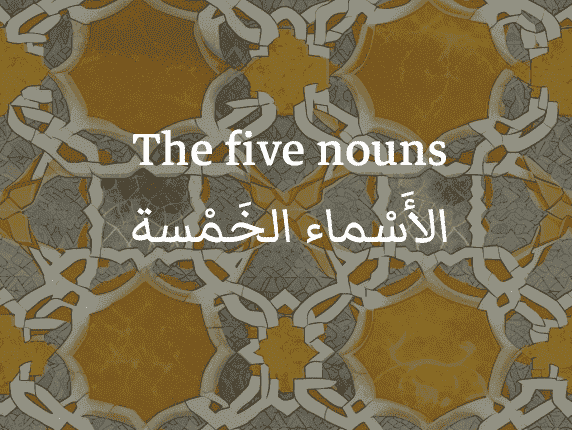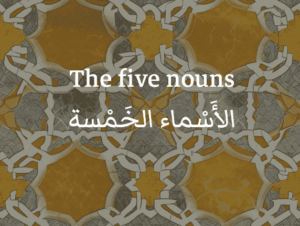The five nouns / الأَسْماء الخَمْسة

The Arabic five nouns, are particular nouns that see their case vowels (fatḥa, ḍamma and kasra) become, respectively, letters ا and و and ي positioned as 1st term of annexation (مُضاف). This only happens when their 2nd term of annexation (المُضاف إِليه) isn’t the 1st person singular pronoun ي (I/me).
Those are the five nouns:
| أَب | أَخ | حَم | فُو | ذُو |
| father | brother | Father-in-law (of the wife) | mouth | the one that possess |
- In the nominative case (مَرْفُوع) those nouns are going to end with the و
| Abu Bakr is brave | أَبُو بَكْرٍ شُجاع |
| The teacher’s brother is young | أَخُو المُعَلِّمِ صَغِيرٌ |
| Latifa’s father-in-law is in the house | حَمو لَطِيفةَ في البَيْتِ |
| The mouth of the man is open | فو الرَجُلِ مَفْتوحٌ |
| The man that possess knowledge is wise | الرَجُلُ ذو العِلْمِ حَكِيم |
- In the accusative case (مَنْصُوب) those nouns are going to end with the ا
| I saw Abu Bakr | رَأَيْتُ أَبا بَكْرٍ |
| I waited for the teacher’s brother | اِنْتَظَرْتُ أَخِا المُعَلِّمِ |
| I welcomed Latifa’s father-in-law | رَحَّبْتُ حَما لَطِيفةَ |
| I opened the lion’s mouth | فَتَحْتُ فا الأَسَدِ |
| I respect the one that has knowledge | أَحْتَرِمُ ذا العِلْمِ |
- In the genitive case (مَجْرُور) those nouns are going to end with the ي
| I talked with Abu Bakr | تَكَلَّمْتُ مَعَ أَبِي بَكْرٍ |
| I play with the teacher’s brother | ألْعَبُ مَعَ أَخِي المُعَلِّمِ |
| The book belongs to Latifa’s father-in-law | الكِتابُ لِحَمِي لَطِيفةَ |
| The smell is from the lion’s mouth | الرائِحةُ من في الأَسَدِ |
| I am learning from the one with knowledge | أَتَعَّلَمُ مِنْ ذي العِلْمِ |
Note: These rules are not applicable to dual and plural forms of the five nouns.
Note 2: فو is only used as a 1st term of annexation (مُضاف), for other usage we’ll prefer it’s equivalent فُمّ.
Note 3: ذو has only 2 different forms for each the dual and plural forms.
الجَمْع (plural) المُثَنّى (dual) المُفْرَد (singular) ذوو / ذَِوِي ذَوا / ذوَيْ ذو / ذا / ذي المُذَكَّر
Masculineذوات ذواتا / ذواتَيْ ذات المُؤَنَّث
Feminine
The five nouns

Learn about the five nouns in Arabic grammar with examples and explanations. Understand how to identify and use these essential parts of speech in your writing and conversation. Improve your understanding of Arabic grammar with our comprehensive guide to the five nouns.
Course Provider: Organization
Course Provider Name: ArabiKey
Course Provider URL: https://arabikey.com
5

Responses